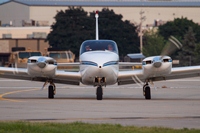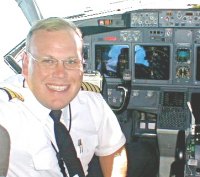This Forum is a place for Piper Comanche pilots to communicate and discuss technical issues
If you join or reset a password, please check your Spam Email box for emails from Admin at ComancheTechTalk.com
Please put your questions on the forum as well so everyone can read and respond. Someone else might be having similar questions.
All questions or topics on the Forums automatically get sent to the Tech team as well.
Performance chart formulas
I know this isn't necessarily a maintenance issue but based on my short time here I'm convinced some of the contributors here may have the answers I'm looking for.
Can anyone point me to the actual mathematical formulas used to generate the performance charts in Chapter 5 of the Twin Comanche POH? Ours is a 1965 PA-30 if that matters.
Thanks,
Tim

Timothy Poole- Posts: 122
- Joined: Tue Oct 28, 2014 8:43 pm
- Location: KVKX
Re: Performance chart formulas
Used to do cross country racing with my Mom in our Twin. Always very interested in performance. What prompts your question? What are you trying to accomplish? Happy to try to help.
Patricia Jayne (Pat) Keefer ICS 08899
PA-39 #10 Texas

N3322G- ICS member

- Posts: 1911
- Joined: Thu May 08, 2008 1:58 pm
- Location: Fort Worth, Texas area
Re: Performance chart formulas
I'm writing an iOS app that will let me do all performance calcs prior to flight without having to consult the diagrams in the POH. We're based at a 2600' strip so take off performance, accelerate stop distance, etc. are very important.
Thanks for the offer of help. Any info would be greatly appreciated.
Tim

Timothy Poole- Posts: 122
- Joined: Tue Oct 28, 2014 8:43 pm
- Location: KVKX
Re: Performance chart formulas
I learned to fly out of a 2,800 foot strip so I understand your concerns. Our mantra was if you aren't going to be down in the first third of the runway, go-around. As I transitioned from a Cherokee 140 to the Twin, I got really good at going around until I got a handle on speed control in the Twin.
One of the things we learned about Comanches back when they were new was not all of them were created equal - some were faster and when we were racing against mfg based handicaps, we cared about a 0.5-2 kt speed difference. In the 9170s we created our own perf charts to know whether it was worth climbing for a tailwind or not.
Fast forward a few decades and not very many Comanches are stock anymore - ours isn't. At last check it has 31 mods. We have personal data that shows engine performance varies with hours -200 was the sweet spot for us so we use the POH perf charts as guides but also recognize that our ability to fly the Twin in all phases may not be the same as the test pilot Piper used to set those charts and our aircraft while maintained to the Service Manual specs or better, may not be at the same level as the aircraft used to develop those perf charts. If Kristin posts here, perhaps she'll share her story on an actual accelerate and stop emergency in another Twin aircraft.
If I were in your shoes, I'd go to another airport with a nice long runway and do your own tests and go from there.
Patricia Jayne (Pat) Keefer ICS 08899
PA-39 #10 Texas

N3322G- ICS member

- Posts: 1911
- Joined: Thu May 08, 2008 1:58 pm
- Location: Fort Worth, Texas area
Re: Performance chart formulas

JIMICS2452- ICS member

- Posts: 254
- Joined: Sat Mar 09, 2002 9:26 pm
- Location: Pine Shadows Airpark - North Fort Myers, FL
Re: Performance chart formulas
Landing calcs are not as large a concern as take off calcs, specifically accelerate stop distance. The FSDO is particularly keen on this (we're a 141 school). I've attached the chart from the POH for reference. Having to break this out to figure out if we will have enough runway to accelerate and stop in case of a problem on a given day is a PITA. Single engine climb calcs are another one.
And before someone mentions it, I know that accelerate / stop distances are not a limitation for Part 91 ops with light twins. Doesn't mean the FAA isn't paying attention to our operation or that we shouldn't know the information for safety purposes for each flight.
Tim

Timothy Poole- Posts: 122
- Joined: Tue Oct 28, 2014 8:43 pm
- Location: KVKX
Re: Performance chart formulas
The takeoff and landing distance charts are flight test charts with no safety factor added in, and if you haven't found out by experience, the chart you have attached is extremely suspect. I have yet to fly a Twin Comanche that will keep the mains on the ground to 90 mph at flaps 15 in anything other than an an extremely "max gross" situation. Most come off somewhere in the 75-80mph range and, to keep this on a maint. footing, causes much less damage, to let the plane fly off at about 7-10 degrees pitch, retract the gear at positive rate, and by the time the gear is up you are through 90 mph, which as you know is a theoretical number at this point because the gear was down, flaps were/are at 15, you are in ground effect, and you probably aren't anywhere near 3600# or the aft CG limit. Your real Vmc is most likely somewhere near 75 mph in these conditions. Try it for yourself at altitude and see what the different configurations do to Vmc based on the published "formula" number. There is a reason why the FAA does not make the charted numbers mandatory in light aircraft. Its because they are most often not repeatable by the average pilot in the average airplane. They were developed by test pilots with new airplanes under perfect conditions. As for all the other charts, figure the percentage change based on the perameters and write that into the program. After all its still aviation. Measure with a micrometer, mark it with a crayon, and cut it with a chainsaw...
-Zach

Zach Grant L1011jock- Technical Advisor
- Posts: 1404
- Joined: Mon Mar 22, 2004 4:35 pm
- Location: Indianapolis KEYE


